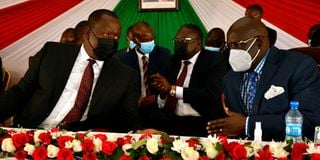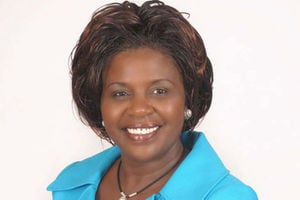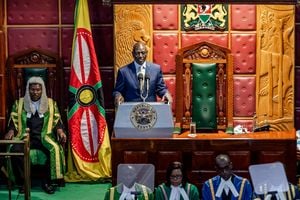Candidates in 175 schools to sit exams in other centres

Education Cabinet Secretary George Magoha (right) confers with his Interior counterpart Fred Matiangi during the launch of the 2021 examination period and issuance of security padlocks at the Kenya School of Government grounds on February 18, 2022.
Candidates in 175 primary and secondary schools will sit their tests in neighbouring schools after the Kenya National Examinations Council (Knec) implemented a new regulation requiring schools to have a minimum of 30 candidates to be registered as examination centres.
This comes as the government formed a command centre for this year’s Kenya Certificate of Primary Education (KCPE) and the Kenya Certificate of Secondary Education (KCSE) exams.
The new regulation, which has come to effect for the first time in the 2021 KCPE and KCSE exams, has affected 151 primary schools and 24 secondary schools.
Speaking yesterday during the launch of the examination period and issuance of security padlocks for the examination containers to county directors of education at the Kenya School of Government, Nairobi, Knec chief executive David Njengere announced that this year a total of 1,225,507 candidates in 28,316 KCPE examination centres have registered for the examination as compared to 1,191,752 candidates in 28,467 centres in 2020. This is an increase of 33,755, representing 2.75 per cent.
In the KCSE examination, 831,015 candidates have registered in 10,413 centres compared to 752,981 in 10,437 centres in 2020.
“This is a candidature increase of 78,034, representing 9.39 per cent,” said Dr Njengere.
He said the KCPE centres will be served by 491 distribution centres while 483 distribution centres will cater for the KCSE centres.
Education Cabinet Secretary George Magoha has, however, asked exam administrators not to deny centres that might have less than 30 candidates exams as required by the law.
“This year, examination centres must have a minimum of 30 candidates, but this is not to say those with less than 30 will be denied exams. If the learners are too low, they will sit the exams in neighbouring schools,” said Prof Magoha
Previously, the law prescribed the minimum number of candidates per examination centre as 15.
An attempt to overturn the new regulation failed after the court upheld that examination centres must have 30 candidates.
Prof Magoha also announced that preparations for the 2021 Standard Eight and Form Four national exams have been finalised.
The CS assured parents, teachers and the candidates that no paper has leaked. “So far, no examination paper has leaked to the public. Those planning to buy any paper from the streets, do not buy as no paper has leaked,” said Prof Magoha.
The CS also warned students against burning schools or engaging in any other form of unrest.
“For the candidates planning to burn schools before the exam period, we shall close the schools and they will come back and sit the exams under trees if they have to ,” said Prof Magoha.
Knec chief executive Njengere said as a result of election campaigns, migration of people from one region to another due to insecurity and terrorism, the administration of the examinations may face some challenges.
However, he said measures have been put in place to ensure that no candidate misses the tests.
Last year, the government had to use helicopters to deliver examinations in some areas due to security threats.
Dr Njengere asked the sub-county education directors and deputy county commissioners to ensure that the security padlocks are handled with care to avoid losses and damages.
“During the administration of examinations, the examination materials should be issued to centre managers in person and escorted by armed security personnel,” said Dr Njengere.
The CEO also announced that a command centre has been operationalised to enhance communication and monitor the conduct of examinations.
The 2021 KCSE national examination is scheduled to start on February 28 and end on April 1, while the KCPE tests will be administered between March 7 and March 9.
Interior Cabinet Secretary Fred Matiang’i said the ministry has made necessary arrangements to ensure there will be adequate security during the examination period.
“We have also rescheduled leave days for all our officers to ensure that the exams are administered smoothly across the country. We will also set up a separate command centre that will lead security,” said Dr Matiang’i.
Teachers Service Commission CEO Nancy Macharia said this year, the commission has identified and vetted 242,406 teachers who will serve as invigilators, supervisors, centre managers and examiners.





